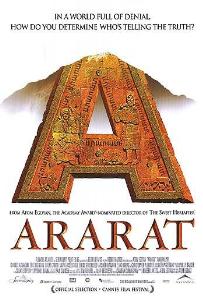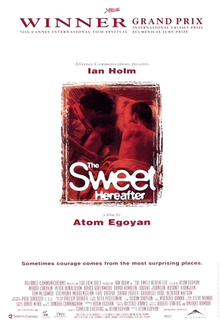Related Research Articles

The Hanging Garden is a British-Canadian drama film, written and directed by Thom Fitzgerald and released in 1997. Fitzgerald's feature debut, the film was shot in Nova Scotia.

Atom Egoyan is a Canadian filmmaker. Emerging in the 1980s as part of the Toronto New Wave, he made his career breakthrough with Exotica (1994), a film set in a strip club. Egoyan's most critically acclaimed film is the drama The Sweet Hereafter (1997), for which he received two Academy Award nominations. His biggest commercial success is the erotic thriller Chloe (2009).

Ararat is a 2002 historical-drama film written and directed by Atom Egoyan and starring Charles Aznavour, Christopher Plummer, David Alpay, Arsinée Khanjian, Eric Bogosian, Bruce Greenwood and Elias Koteas. It is about a family and film crew in Toronto working on a film based loosely on the 1915 defense of Van during the Armenian genocide. In addition to exploring the human impact of that specific historical event, Ararat examines the nature of truth and its representation through art. The genocide is disputed by the Government of Turkey, an issue that partially inspired and is explored in the film.
The 18th Genie Awards were held on 14 December 1997 to honour Canadian films released that year. to honour the best Canadian films of 1997. The ceremony's hosts were film critics Geoff Pevere and Cameron Bailey.
The 23rd Genie Awards were held in 2003 to honour films released in 2002. The ceremony was hosted by Arsinée Khanjian and Peter Keleghan.
The Academy of Canadian Cinema and Television presents an annual award for Best Motion Picture to the best Canadian film of the year.
The Academy of Canadian Cinema and Television presents an annual award for Best Performance by an Actor in a Leading Role to the best performance by a lead actor in a Canadian film. The award was first presented in 1968 by the Canadian Film Awards, and was presented annually until 1978 with the exception of 1969, when no eligible feature films were submitted for award consideration, and 1974 due to the cancellation of the awards that year.
The Academy of Canadian Cinema & Television presents an annual award for Best Performance by an Actress in a Leading Role to the best performance by a lead actress in a Canadian film. The award was first presented in 1968 by the Canadian Film Awards, and was presented annually until 1978 with the exception of 1969, when no eligible feature films were submitted for award consideration, and 1974 due to the cancellation of the awards that year.
The Academy of Canadian Cinema and Television presents an annual award for Best Performance by an Actor in a Supporting Role to the best performance by a supporting actor in a Canadian film. The award was first presented in 1970 by the Canadian Film Awards, and was presented annually until 1978 with the exception of 1974 due to the cancellation of the awards that year.
The Academy of Canadian Cinema and Television presents an annual award for Best Performance by an Actress in a Supporting Role to the best performance by a supporting actress in a Canadian film. The award was first presented in 1970 by the Canadian Film Awards, and was presented annually until 1978 with the exception of 1974 due to the cancellation of the awards that year.
The Academy of Canadian Cinema and Television presents an annual award for Best Achievement in Direction to the best work by a director of a Canadian film.
The Canadian Screen Award for Best Achievement in Art Direction/Production Design is awarded by the Academy of Canadian Cinema and Television to the best Canadian film art direction/production design.
The Canadian Screen Award for Best Costume Design is awarded by the Academy of Canadian Cinema and Television to the best Canadian costume designer. It was formerly called the Genie Award for Best Achievement in Costume Design before the Genies were merged into the Canadian Screen Awards.
The Canadian Screen Award for Best Live Action Short Drama is awarded by the Academy of Canadian Cinema and Television to the best Canadian live action short film. Formerly part of the Genie Awards, since 2012 it has been presented as part of the Canadian Screen Awards.

The Sweet Hereafter is a 1997 Canadian drama film written and directed by Atom Egoyan, adapted from the 1991 novel by Russell Banks. It tells the story of a school bus accident in a small town that kills 14 children. A class-action lawsuit ensues, proving divisive in the community and becoming tied with personal and family issues. It stars an ensemble cast featuring Ian Holm, Sarah Polley, Maury Chaykin, Bruce Greenwood, Tom McCamus, Gabrielle Rose, Arsinée Khanjian and Alberta Watson.
Phillip Barker is a Canadian production designer, filmmaker and visual artist based in Toronto, Ontario.
Linda Muir is a Canadian costume designer. Her studio is in Toronto, Ontario.
The Ideal Man is a Canadian romantic comedy film, directed by George Mihalka and released in 1996. The film stars Marie-Lise Pilote as Lucie, a successful magazine editor who feels her biological clock ticking as she has reached the age of 35 without becoming a mother, and sets out on a quest to meet as many men as possible over the next three months in the hopes of finally finding the ideal man to father a child.
The Revenge of the Woman in Black is a Canadian crime comedy film, directed by Roger Cantin and released in 1997. A sequel to his 1991 film Four Stiffs and a Trombone , the film revisits Augustin Marleau, now a successful comedian who is framed for murder by his manager Édouard Elkin.
Gregory Middleton is a Canadian cinematographer, who won the Genie Award for Best Cinematography at the 29th Genie Awards for his work on the film Fugitive Pieces.
References
- ↑ "Beth Pasternak". British Film Institute . Archived from the original on March 25, 2017. Retrieved 24 March 2017.
- ↑ Playback Staff (17 November 1997). "The 1997 Genie Awards". Playback . Retrieved 24 March 2017.
- ↑ Dillon, Mark (16 September 2002). "Egoyan, Sarossy think bigger on Ararat". Playback . Retrieved 24 March 2017.
- ↑ McKay, John (14 February 2003). "Egoyan's Ararat named best film, takes 5 awards at the Genies". The Globe and Mail . Retrieved 24 March 2017.